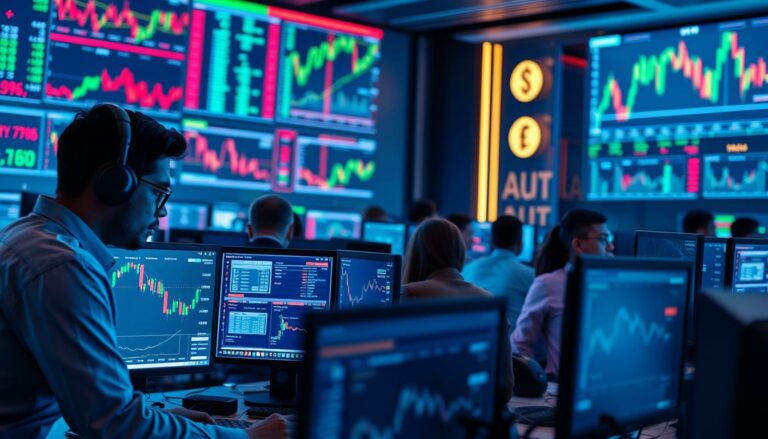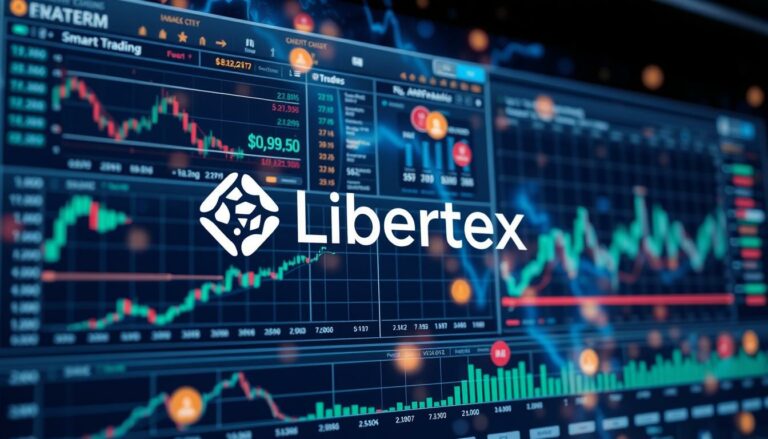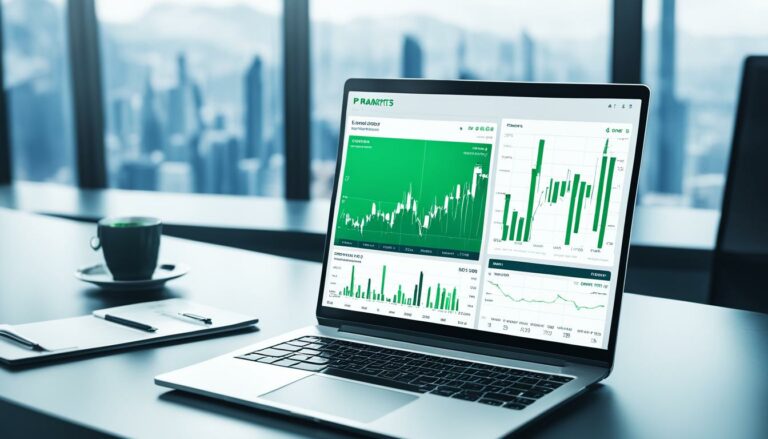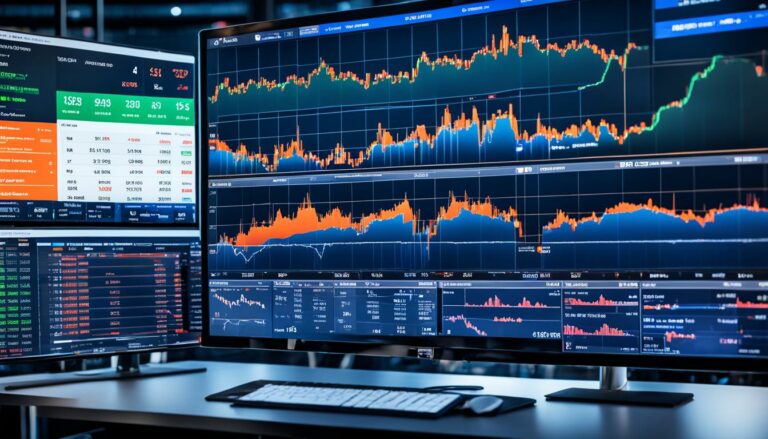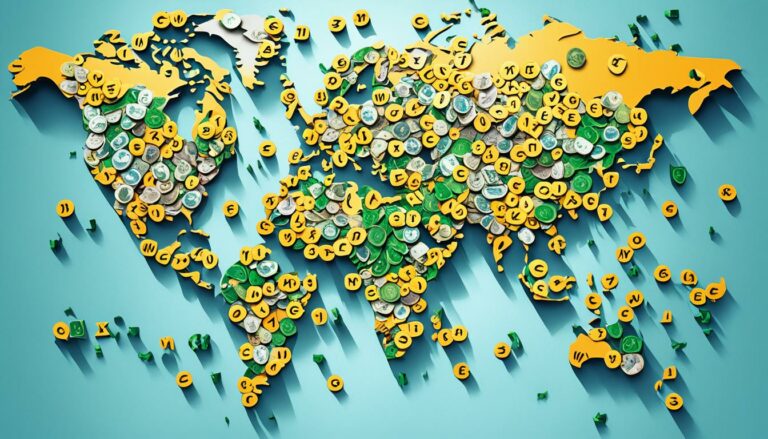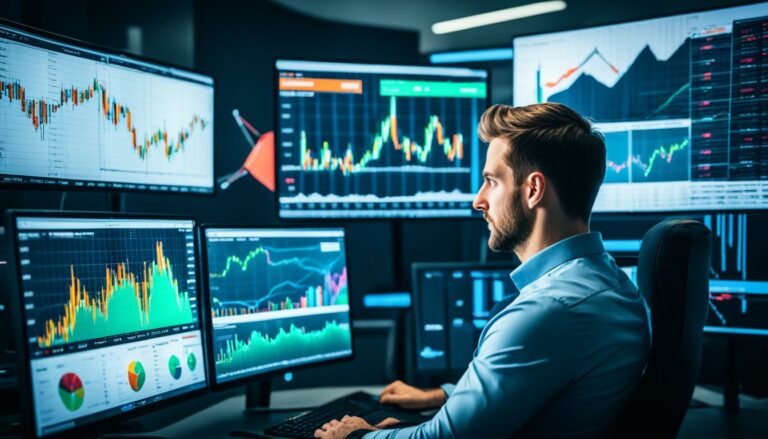Did you know the forex market has nearly $7.5 trillion traded every day on average? It shows the massive chances in forex trading. Picking the right broker is crucial, whether you’re just starting or you know a lot.
At Trading2day, we’ve checked many sources to find the top forex brokers. These brokers are good for both beginners and experts. We looked at things like pricing for currency pairs, leverage, and the trading platforms. We also checked if they follow the rules, and how easy it is to put money in or take it out. These things are key to knowing if a broker is good and safe.
A good broker gives you fair prices on currency pairs for lower costs. They also let you use leverage, which means you can trade with more money than you have. This can lead to bigger wins. A platform that’s easy to use is essential for making trades and seeing what’s happening in the market. A trustworthy broker follows the law to keep your money safe from scams. It’s also important to be able to easily add or take out your money from your trading account.
We’ve done a lot of research to find the best brokers. Some of the top ones include IG, AvaTrade, and eToro. They’re good because they offer things like easy learning, copy trading, and trustworthiness. There are also Capital.com, XTB, and CMC Markets. Each of these has something special, like being easy to use or offering a lot of help with learning.
How to Choose a Forex Broker as a Beginner Trader
Starting out in forex trading might seem hard. The first step is choosing the right forex broker for you. It’s key to pick one that fits your trading goals and needs. You must think about several factors that can affect how you trade and your profit.
Regulation Compliance and Security
Choose a forex broker that is well-regulated. In the United States, top brokers are part of the National Futures Association (NFA) and regulated by the Commodity Futures Trading Commission (CFTC). These groups make sure brokers follow strict rules, making your trading fair and safe. Trading with a regulated broker protects your money and gives you a secure trading space.
Beginner-Friendly Platforms
Finding a user-friendly trading platform is important, especially for beginners. Good platforms are easy to use and have helpful tools. They let you see real-time data, use analysis tools, and customize charts. Also, some brokers have demo accounts. These let you practice trading without using real money. For beginners, they are a great way to learn and try strategies.
Suitable Account Types
Brokers offer different types of accounts to match various trading styles and budgets. They range from standard to micro accounts. Standards are for those with more experience, while micro accounts fit beginners with less money to start. Pick an account based on your risk level, finances, and trading goals.
Reliable Customer Support
Good customer support is important for all traders, especially beginners. Look for brokers with helpful support available at all times. They should quickly answer your questions and solve any issues. This helps you trade with less worry.
Affordable Costs
Think about trading costs like spreads and fees. Every broker has different prices, so compare them to find good value. Look at the spread for common currency pairs, such as EUR/USD, to see what’s a deal that doesn’t cut quality.
Educational Resources
For new traders, learning materials from brokers are a great help. Find brokers that offer tutorials, webinars, and courses. They teach you the basics of trading, how to analyze, manage risks, and make strategies. A broker that provides these resources shows they care about your trading success.
| Broker | Average Spread for EUR/USD | Minimum Deposit |
|---|---|---|
| IG | 0.98 | £250.00 |
| AvaTrade | 0.92 | $100 |
| eToro | 1 | $10 – $10,000 |
| Plus500 | 1.5 | €100 |
| Capital.com | 0.67 | $20 |
| XTB | 1.0 | No specified minimum deposit |
| CMC Markets | 0.61 | No specified minimum deposit |
Choosing your broker wisely is crucial as a beginner. Look for ones that are regulated, offer easy platforms, have various account types, great support, fair costs, and educational help. Spend time researching and comparing brokers to pick the one that fits your needs and goals best.
Top Forex Brokers for Beginners
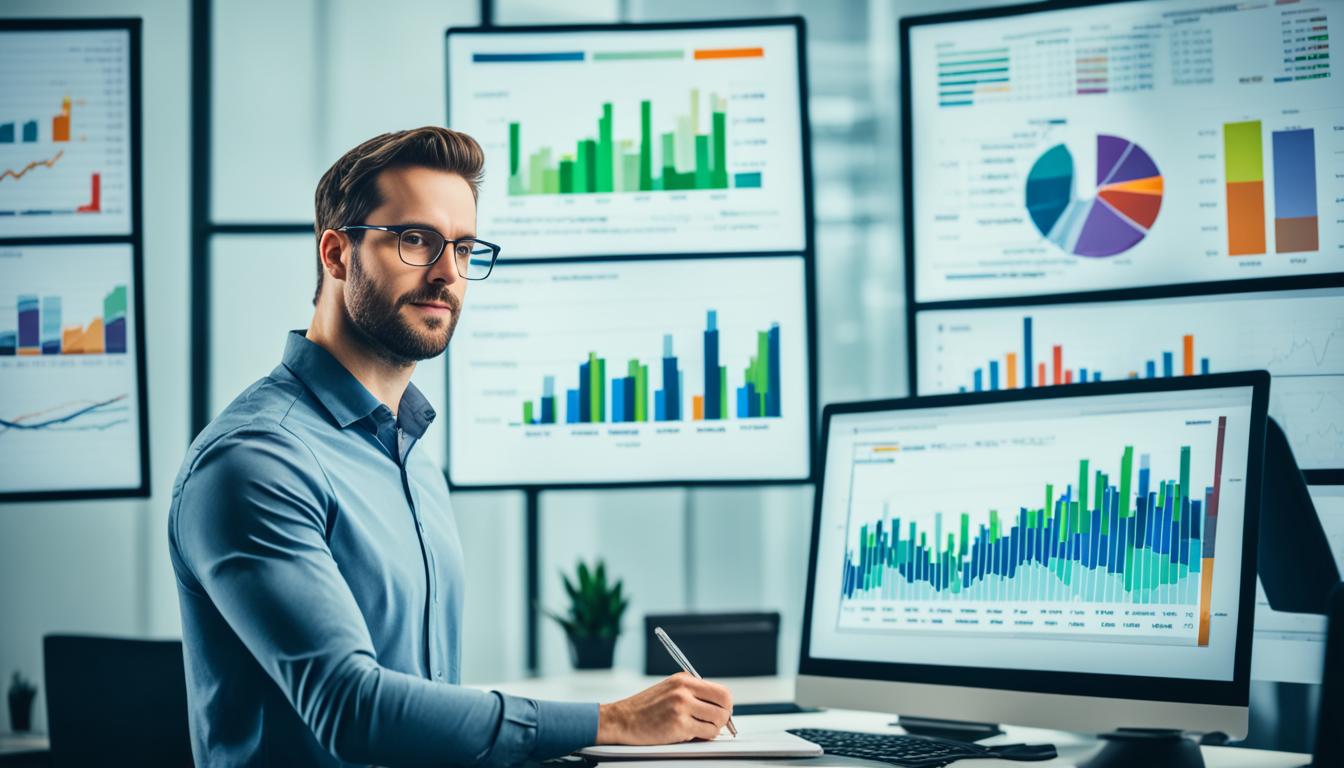
For beginners, finding the right forex broker is crucial. They need ones with simple platforms, lots of learning materials, and a small minimum deposit. We have picked the best ones just for you.
It’s vital to pick brokers that follow rules closely. This means your money is safe and they are honest.
Plus500 is great for newcomers. It has an easy-to-use platform and a small minimum deposit. This opens trading to those on different budgets.
FOREX.com is also a favorite, especially in the U.S. with a $100 minimum deposit and over 80 currency pairs to trade.
Trading.com is perfect if you want a simple platform and a low deposit. It only asks for $50 and has small fees for major currency pairs.
AvaTrade is the top choice for broad trading options and good pricing. It offers up to 400:1 leverage for beginners.
If you like copy trading, eToro stands out. It lets you follow other traders and has a big range of markets.
IG Markets is highly recommended for CFD trading. It has over 17,000 assets, requires $250 to start, and offers 50:1 leverage in the U.S.
Lastly, for a broker suitable for all trading types, Deriv is a top recommendation. It provides trading options, multipliers, and detailed charts for analysis.
Keep in mind, choosing the right broker is key when starting. Consider aspects like rules, easy-to-use platforms, learning materials, and minimum deposits. A good broker will help you learn and improve your trading skills.
Top Forex Brokers for Beginners – Comparison Table
| Broker | User-Friendly Platform | Minimum Deposit | Educational Resources |
|---|---|---|---|
| Plus500 | ✓ | Low | Extensive |
| FOREX.com | ✓ | $100 | Comprehensive |
| Trading.com | ✓ | $50 | Wide range |
| AvaTrade | ✓ | Competitive | Extensive |
| eToro | ✓ | Flexible | Rich |
| IG Markets | ✓ | $250 | Comprehensive |
| Deriv | ✓ | Accessible | Advanced |
Source: Author’s Research
Trading Platforms and Tools for Beginners
Starting with forex trading means finding the right platform. It should be easy to use, especially for new traders. A good platform helps a lot, making your trading smooth and effective.
Consider platforms such as IG, Capital.com, and CMC Markets. They are known for their easy interfaces. These places make trading simpler with tools that aren’t confusing. This way, you can focus on trading, not figuring out the platform.
For beginners, having a demo account is a must. Demo accounts are like practice rounds without using real money. They are invaluable for new traders. Platforms like eToro and Plus500 provide these accounts to start learning.
Platforms should also let you keep a watchlist. A watchlist helps you track the currencies you’re interested in. This keeps you updated on what’s happening in the market. It’s a key way to make smart trading choices.
Don’t forget about educational resources. They are key for success. Forex platforms offer lots of learning tools. These include videos, webinars, and dictionaries to teach you about trading and risk management.
When picking a trading platform, think about what you need. Go for platforms that are beginner-friendly, and offer demo accounts, watchlists, and education. These features will help you start strong in the forex market.
Regulatory Compliance and Safety
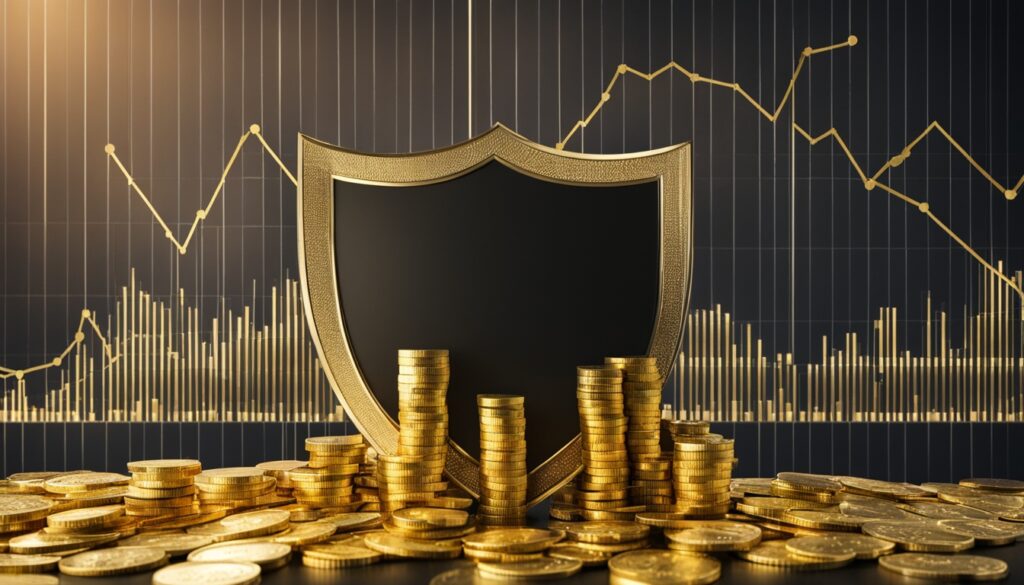
Choosing a forex broker means focusing on safety and rules. Pick a broker who works inside agreed rules. This way, your money stays safe and your trades are trusted.
The NFA in the U.S. grants licenses after checking brokers well. A license shows the broker is good to do business. Always make sure your broker has this approval before investing with them.
Safety of your money is key in choosing a broker. They must keep your money in a different account from theirs. This keeps your money safe if the broker fails. Also, brokers might join funds that help if they have money problems.
Top brokers make extra effort to keep your money safe. They keep your money in secure places and follow strict banking rules. This shows they care about you and your security.
Segregated Accounts
Having special accounts for your money is important. It separates your money from the broker’s. So, if the broker has trouble, your money is still safe.
This action shows the broker really cares about keeping your money safe. It gives you trust and shows that the broker is honest.
| Leverage Ratios | Regulatory Compliance | Segregated Accounts | Safety of Funds | Reliable Brokers |
|---|---|---|---|---|
| Limited to 50:1 on major currencies | Ensuring compliance with regulatory frameworks | Protecting client funds from operational funds | Enhancing the safety of investments | Maintaining a trustworthy trading environment |
| Limited to 20:1 on minor currencies | Prioritizing regulatory standards | Providing an extra layer of fund protection | Offering peace of mind to traders | Demonstrating a commitment to transparency |
Regulators are important for making brokers follow the rules. They make sure brokers have enough money to be stable. Regulators also stop unfair moves and solve problems fairly, keeping trading honest.
It’s crucial to check a forex broker’s registration. Look for brokers who follow strict checks. In the U.S., the NFA offers a tool called BASIC to check a broker’s status by name or ID.
Choosing a regulated forex broker makes trading safer. Make sure your broker puts safety and honesty first. This way, you can trade with peace of mind.
Account Funding and Deposit Options
Choosing a forex broker means looking at how to fund your account. You need to see what options they offer. This includes the minimum you can deposit and how easy it is to take money out.
Minimum Deposit Requirements
Be aware of a broker’s minimum deposit before you open an account. It’s the least you need to start trading. Luckily, there are many brokers with different options. Some let you start with just $1,000, making trading accessible even for beginners.
Deposit Methods
Brokers have many ways for you to add money to your account. Credit cards are often used. They are fast and easy for transactions.
Every deposit method has its own rules. Wire transfers from banks could cost around $30 each. Paper checks may take 10 days. Remember these when picking your method.
Look at the cost and speed of each way you can deposit. Lots of brokers have different options like bank wires or e-wallets. This gives you more choices.
Withdrawal Options
Withdrawing money should be easy. Good brokers make it simple and fast. They should not keep your money from you.
Watch out for withdrawal fees and how long it takes. Some brokers take a fee or a bit of your money when you take it out. The time it takes to get your money can change too.
Choose a broker with many withdrawal options. They could offer bank transfers or e-wallets. This makes taking your money out a breeze.
Think about how you can put money in and take it out when picking a forex broker. Look at the costs and the time it takes. This will help you make a smart choice.
Educational Resources for Beginners

Being new to the forex market means you need to learn a lot. Many brokers have things to help you. They offer:
- Forex Education: Articles and guides cover a lot about forex trading. They teach you the basics and important terms. They also show you strategies to start with.
- Video Tutorials: Watching videos can make complex ideas clear. These tutorials help with chart analysis, managing risk, and making trades.
- Webinars: These are live online talks by experts. They give you tips, show live examples, and discuss strategies and managing risks.
- Courses: Some brokers have full courses. They go from basic to advanced trading. You can take quizzes, do projects, and get a certificate when you finish.
Using these tools makes you smarter, teaches you important skills, and helps you feel sure about your trading choices. This is good for starting in forex.
Benefits of Educational Resources
Learning with these resources is great for new traders. Here’s why:
- Knowledge Building: They teach you important things about trading. This lets you make better decisions.
- Skill Development: You learn how to analyze, manage risk, and make trades well.
- Confidence Boost: Knowing more about trading boosts your confidence. This is important for making trades and managing risks.
- Strategy Development: You get to see many trading styles. This helps you find what works best for you.
- Continuous Learning: Forex is always changing. These resources help you stay on top of what’s new.
Use what forex brokers offer to get better at trading. It will improve your knowledge and how you trade.
Risk Management for Beginners

Forex trading needs smart risk management from every newcomer. The market’s huge leverage with its ups and downs mean you must protect your investment. This makes a strong risk management plan a must to avoid big losses.
Using good risk management in your trading plan helps you understand and decide better in forex. I’ll outline essential practices for beginners:
Utilize Demo Accounts
Start with risk management in demo trading offered by brokers. Trade with pretend money in a realistic, virtual market. This lets you try different strategies and risk methods safely.
Demo trading helps you see which risk strategies are best for you. It’s a no-risk way to prepare for live trading.
Familiarize Yourself with Stop Loss and Take Profit Orders
Stop loss and take profit orders are crucial for managing risks. A stop loss lets you leave a trade if losing hits a set point. A take profit order closes a trade when positives reach a set level.
Setting the right stop loss and take profit levels helps control your risk. Base these levels on how much risk you’re okay with, market trends, and trade specifics.
Understand Your Risk Tolerance
Knowing how much risk you can handle is key. Your risk tolerance depends on your money situation, what you aim for in trading, and how okay you are with risk.
Experts say not to risk more than 2% of your trading capital on one trade. This safer choice guards against big losses and keeps your trading money safer.
Keep a Trading Journal
Use a trading journal to review your risk management and trading results. Record why you enter and exit trades, and your risk decisions. This helps you find ways to do better.
A journal tracks your growth, spots mistakes, and hones your risk strategies. It shows your risk and reward math, and your trade wins and losses.
Risk management is always needing tweaks and learning. Starting strong with good risk habits can help avoid losses, save your funds, and up your forex game over time.
Choosing the Right Trading Strategy
Having a strong trading strategy is vital in forex trading. It guides you through market complexities and helps you make wise choices. You can use technical analysis, studying charts and trends. Or try fundamental analysis, looking at economic and political news. Mixing these methods, you can create a strategy that fits your style and goals.
Technical analysis looks at past price movements to forecast future trends. It uses patterns and trends to find good points to buy or sell. Fundamental analysis, on the other hand, focuses on economic and political news. This helps you understand what drives currency values and make smarter trades.
It’s important to have a good risk-reward ratio in your strategy. This measures the profit you might make against the risk you take. A strong ratio can increase your chances of making money in trading. Backtesting, or testing your strategy with historical data, lets you see how it would have done. This can help you make it better by learning from past trades.
Choosing the best strategy for you will take time and practice. As you learn more about the forex market, you can improve your strategy. Always be open to learning and getting advice from experts. With a solid plan and continuous improvement, success in forex trading is within reach.
